
What Trump’s Assault on Law and Lawyers Means for Law Schools
Professor Gershman writes a piece in the New York Law Journal exploring the erosion of legal norms and the threats facing law schools today.
Interview With Pace University Vice-Chancellor: Are There Any Restrictions On Studying In The United States? What Does The Chinese Study Market Need?
Vice President for Enrollment and Placement Robina Schepp discusses U.S. admissions trends and the evolving needs of the Chinese study market in an interview with International Education Channel, following Kaplan’s March admissions summit in Beijing.
Best Large Cities to Start a Business (2025)
Lubin Professor Bruce Bachenheimer shares business insights with WalletHub, contributing to their list of best cities to launch a startup.
Jazz Power Initiative And Harlem School Celebrate Jazz Appreciation Month Together
Sands College of Performing Arts Professor Lisa La Touche is featured in Harlem World Magazine as the special guest artist for Jazz Appreciation Month. An award-winning tap dancer, choreographer, and cultural historian, La Touche has performed globally and currently collaborates with the Apollo Theater while leading her company, Tap Phonics.
'PUSH' Film, Organization Seek To Reduce Stillbirths
FOX 5 DC features Dyson PhD in Mental Health Counseling student Marjorie Vail, where she shared her powerful advocacy work to reduce stillbirths. Her involvement in the documentary PUSH and her ongoing efforts are bringing much-needed attention to this critical public health issue.
Dreaming, Belonging, Thriving: Riya Golani’s Tech Journey
At Pace University, Go-Getters don’t just learn—they lead. And Riya Golani (MS in Computer Science ’25) is no exception. As a master’s student at the Seidenberg School, she’s turning challenges into milestones, passion into purpose, and a dream of NYC into a career at Amazon.


At Pace University, Go-Getters don’t just learn—they lead. And Riya Golani (MS in Computer Science ’25) is no exception. As a master’s student at the Seidenberg School, she’s turning challenges into milestones, passion into purpose, and a dream of NYC into a career at Amazon.
From a Dream to a Decision
“New York City was always a far-fetched dream for me—I never thought it would actually be possible,” Riya recalls. But a desire for growth and a feeling of stagnation at her former job sparked a realization: she needed to upskill, and NYC became the symbol of that next step. “I wanted a place where I could grow, learn, and push myself further.”
During her search for schools with strong computer science programs, Pace stood out. “I chose Pace without hesitation. It wasn’t just about NYC anymore—it was about the experience and education that would truly be worth something,” she says. Seidenberg’s wide range of electives and flexible curriculum sealed the deal.
That flexibility made me feel comfortable, like I belonged. It was the right decision then, and looking back now, I know it was one of the best decisions I’ve ever made.
A Class That Changed Everything
For Riya, one particular Seidenberg course the trajectory of her technical path: Enterprise Computing with Professor Baik Doosan. “Before that, I struggled to grasp even the most basic concepts like APIs or Git. But Professor Baik didn’t just teach—he immersed us in real-world applications, pouring his industry experiences into every lecture.”
Guided by his mentorship, Riya’s class tackled an event exploration project, one that challenged and empowered her. “This was my first full MERN stack project—before that, I had only worked on backend solutions. That class gave me the confidence to start developing my own MERN stack projects, and it completely changed the direction of my technical journey.”
Professor Baik didn’t just stay in the classroom. He became a mentor beyond it—supporting Riya through her job search, interview prep, and career decisions.
Learning Beyond the Classroom
From the Data Science Club and the Google Developer Group to Women in Tech and the Art Club, Riya also dove into the University’s extracurricular scene with enthusiasm.
Pace has an incredibly inclusive culture, and that has allowed me to explore so much beyond just academics.
One major milestone? Representing the Pace AI Lab at the Grace Hopper Celebration. “That experience gave me a huge confidence boost and taught me the invaluable skill of networking and expressing my work effectively.”
She also played a big role in organizing community and cultural events, including the Diwali Celebration and various tech talks. “What’s special about Seidenberg is the accessibility of the faculty and administration. Dean Chen is always reachable—I can literally walk up to her, and if she has even a few minutes, she’ll make time to listen.”
Among all of these extracurricular leadership positions and activities, Riya also had the time to work as a graduate assistant at Seidenberg. “Even though I’m a Computer Science student, I wasn’t limited to just CS work. I had the chance to work on Seidenberg’s social media, thanks to Pace AI Lab’s co-director Katie Todd, who believed in my skills and gave me that opportunity.”

A Supportive Community Like No Other
When asked to briefly describe her Seidenberg experience, Riya said that there are three things that stand out to her:
Inclusivity – “Seidenberg welcomes everyone with open arms.”
Access to Resources – “From career services to faculty mentorship, support is everywhere.”
Immense Support – “The people here genuinely care, and that makes all the difference.”
From starting as a student assistant at Lubin to now being a graduate assistant at Seidenberg and working in the Pace AI Lab, Riya’s Pace opportunities have shaped her career. “Seidenberg is a place that made me feel at home in a new city, in a new phase of life. The professors, administration, and career counselors were always there for me.”
Whenever I needed guidance, I just had to ask, and I received so much love and support.
And the result of all Riya’s incredible determination and experiences? “I got into Amazon as an SDE1 before graduating. That wouldn’t have been possible without Seidenberg. I owe it to this school.”
Riya Golani’s story is more than a student’s journey—it embodies the spirit of Pace: opportunity, empowerment, transformation, and most importantly, a community that truly cares.
Celebrating Innovation and Inclusion: The 11th Annual Disability Film Festival at Pace University
On April 8, 2025, the 11th Annual Disability Film Festival was held at Pace University, welcoming guests, students, and members of the broader New York City community to the University’s downtown campus. This year’s festival continued its tradition of celebrating the lived experiences of people with disabilities in film.
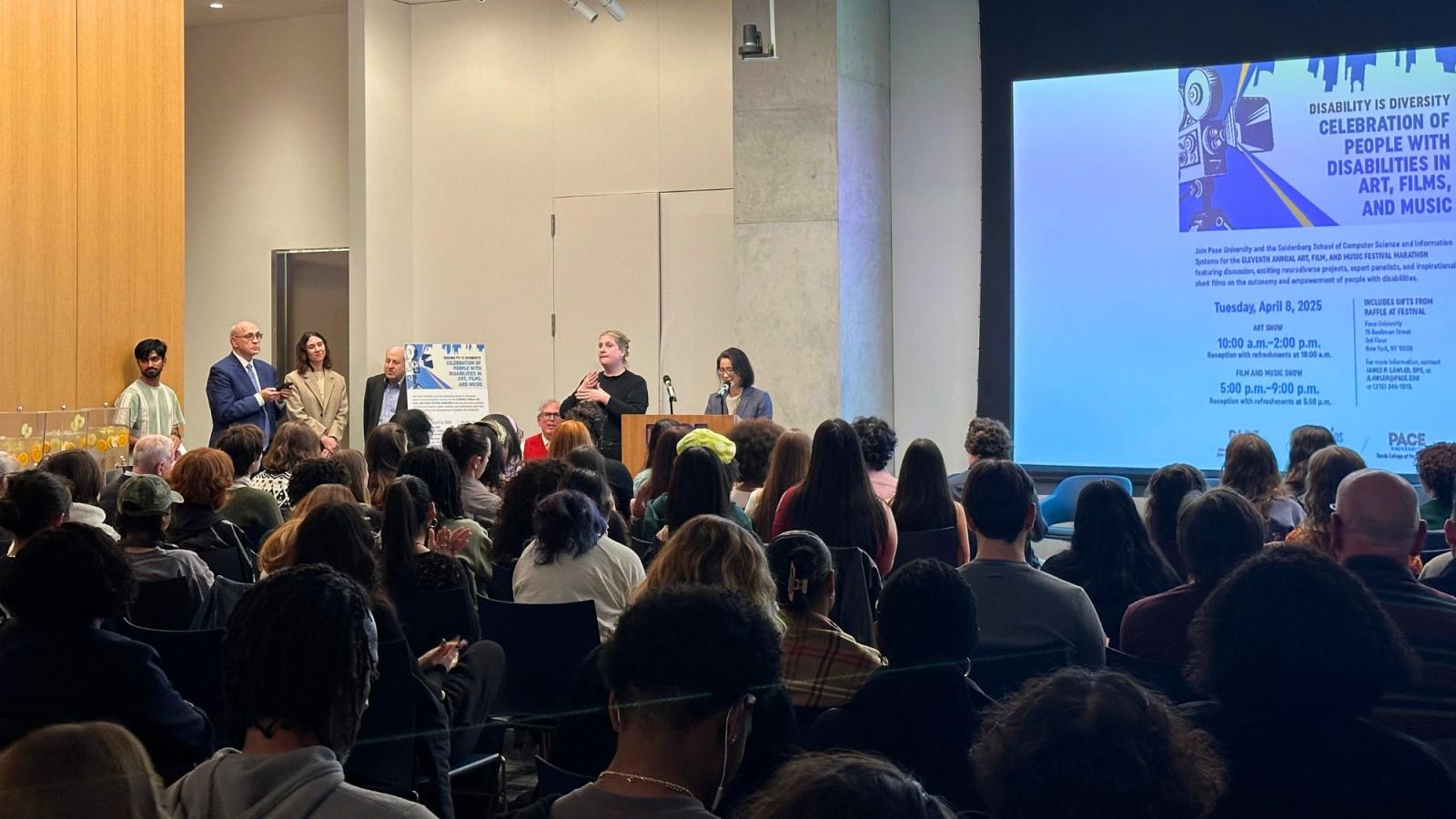
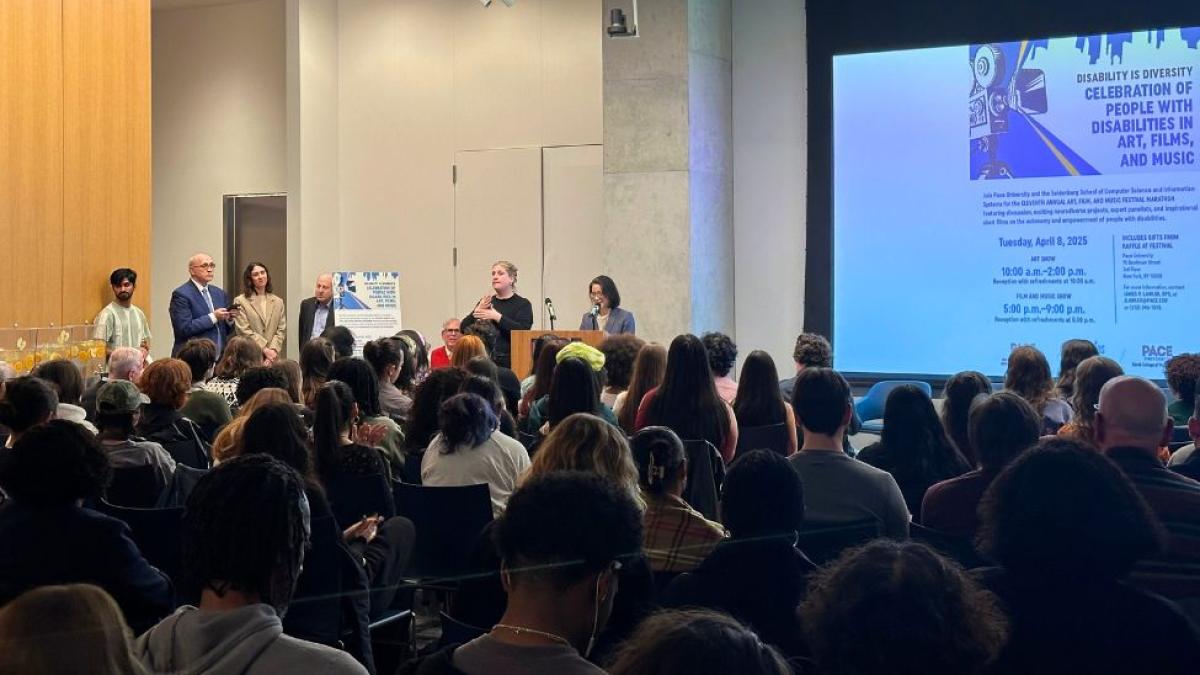
On April 8, 2025, the 11th Annual Disability Film Festival was held at Pace University, welcoming guests, students, and members of the broader New York City community to the University’s downtown campus. This year’s festival continued its tradition of celebrating the lived experiences of people with disabilities in film, and it also introduced a brand new addition to the event that we hope is here to stay: an arts exhibition spotlighting the work of artists with disabilities in the community.
Co-chaired by Professor James Lawler of the Seidenberg School, Beth Rosenberg of Tech Kids Unlimited, and Di Quon Wilms of the Sands College, the event served as both an educational platform and a celebration of diversity. The evening featured screenings of thought-provoking short films, panel discussions with filmmakers and advocates, and interactive presentations from community organizations working at the intersection of technology, art, and disability empowerment.

The event opened with remarks from key university leaders, including President Marvin Krislov, Interim Provost Jonathan Hill, Interim Dean of the Seidenberg School Li-Chiou Chen, and Sands College Dean Jennifer M. Holmes. A special moment was reserved for the remembrance of Pace University’s Joan Brown-Claxton.
One of the evening’s highlights was the distinguished keynote address by Christina Curry, Commissioner of the Mayor’s Office for People with Disabilities of the City of New York. In her powerful address, Commissioner Curry spoke to the critical importance of inclusive representation in media and the arts, and underscored the ongoing efforts across New York City to create equitable spaces for all.
The festival also included live demonstrations, audience-led conversations, and a closing reception, fostering dialogue and community connection. None of this would be possible without the ongoing dedication of Pace’s staff, faculty, and students, and of course without Dr. James Lawler championing the event for over a decade. Now in its eleventh year, the Disability Film Festival Marathon has grown into a dynamic platform for advocacy and creativity, placing innovation and inclusion at the heart of the Pace experience.
Kate Skolnick, Seasoned Public Defender and Criminal Law Scholar, to Join Haub Law as Assistant Professor
The Elisabeth Haub School of Law at Pace University is pleased to announce that Kate Skolnick, an accomplished public defender and respected criminal law scholar, will join the faculty as an Assistant Professor of Law beginning in Fall 2025. Professor Skolnick will teach courses in criminal law and criminal procedure, along with an advanced criminal law seminar.
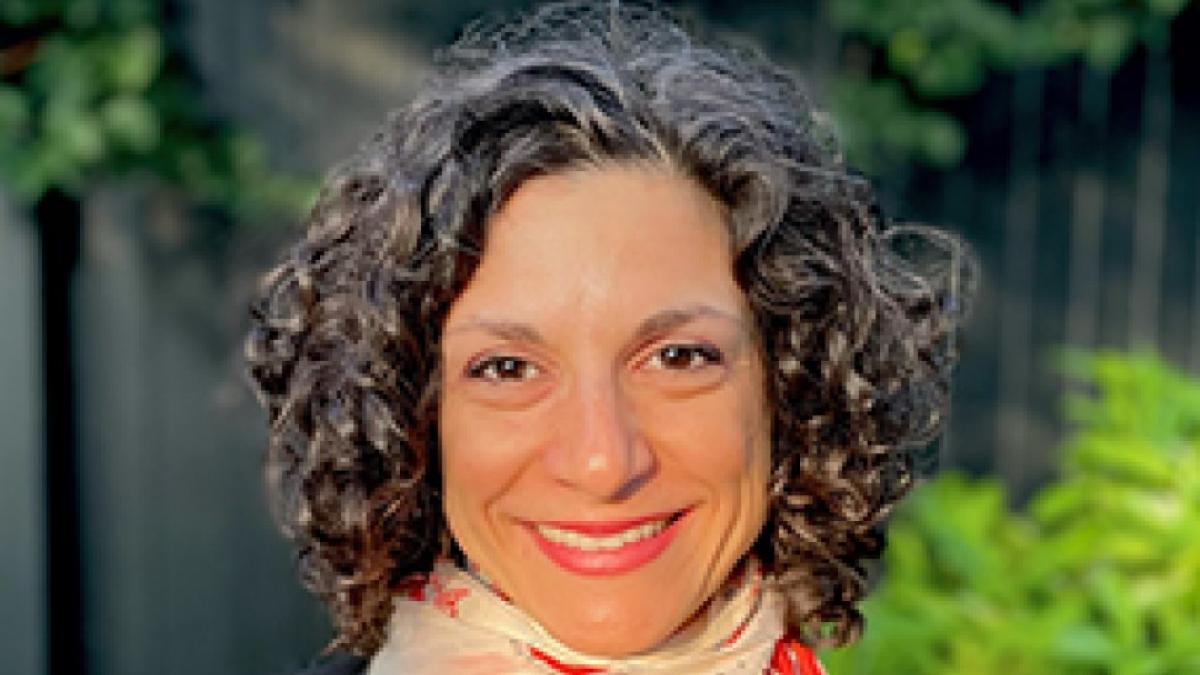
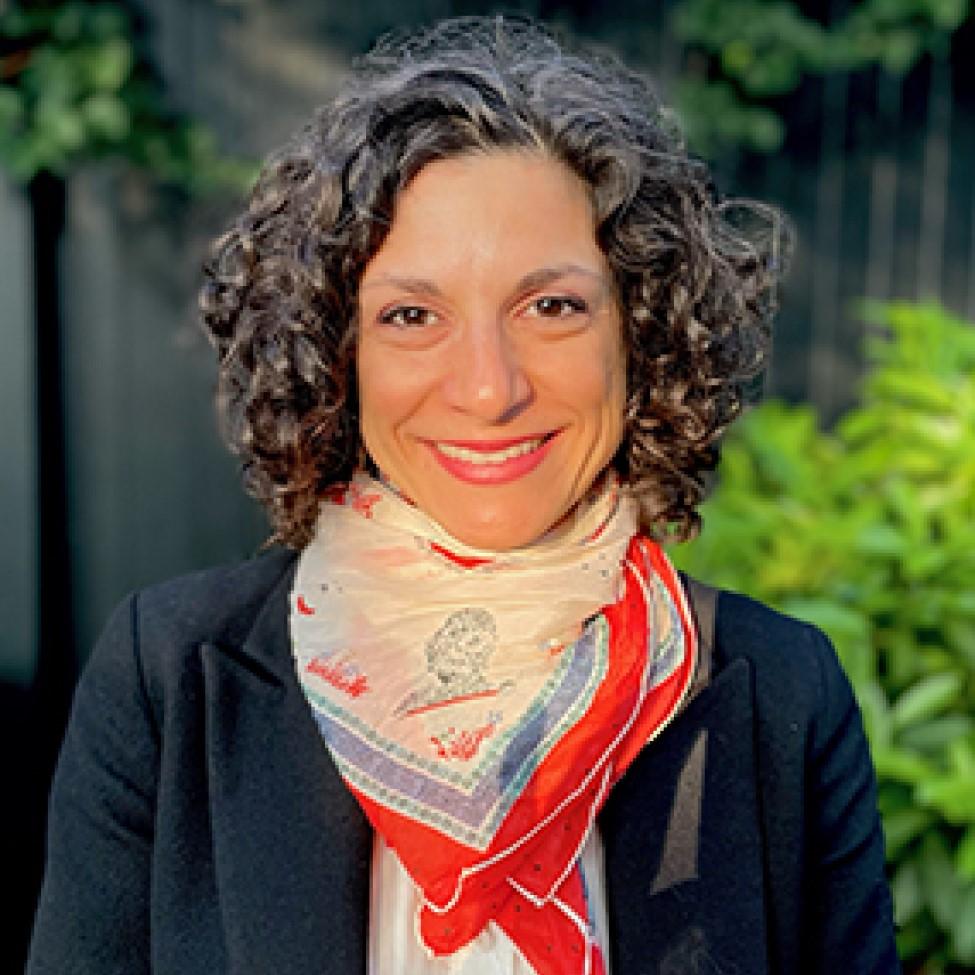
The Elisabeth Haub School of Law at Pace University is pleased to announce that Kate Skolnick, an accomplished public defender and respected criminal law scholar, will join the faculty as an Assistant Professor of Law beginning in Fall 2025. Professor Skolnick will teach courses in criminal law and criminal procedure, along with an advanced criminal law seminar.
Prior to joining Haub Law, Professor Skolnick served as an Acting Assistant Professor in the Lawyering Program at New York University School of Law, teaching first-year lawyering as well as a reading group on prison and police abolition. For nearly a decade and a half before entering academia full-time, Professor Skolnick was a post-conviction public defender at the Center for Appellate Litigation ("CAL"), where she also taught in the Appellate Criminal Defense Clinic at Cornell Law School. At CAL, she litigated a range of cases, from direct appeals, to collateral attacks on convictions in state and federal court, to resentencing petitions, to Sex Offender Registration Act hearings. For her work in attempting to implement the Domestic Violence Survivors Justice Act, a pioneering sentencing reform that has since expanded to other jurisdictions, she received the 2022 Award for Outstanding Achievements in Promoting Standards of Excellence in Mandated Representation from the New York State Bar Association.
“Professor Skolnick comes to Haub Law with an extensive and accomplished background in criminal law,” said Dean Horace E. Anderson, Jr. “With her background as a public defender, coupled with her experience as a professor, she brings a wealth of real-world experience and academic knowledge with her. At Haub Law, we believe in connecting classroom learning with practical, real-world impact and Professor Skolnick’s background and experience will do exactly that. The Haub Law community is eager to welcome Professor Skolnick.”
Before joining CAL full-time, Professor Skolnick worked as a research scholar at the Center for Institutional and Social Change at Columbia Law School, where she examined the institutional impact of programs supporting students moving from incarceration into post-secondary education. Professor Skolnick’s research and teaching focus on a critical examination of the criminal legal system, and in particular on unwinding mass incarceration while promoting the full participation in society of those affected by the carceral system. Her writing has appeared in the N.Y.U. Law Review.
Haub Law provides a robust criminal law curriculum, including prosecution externships, a criminal defense clinic, and several upper-level courses. Professor Skolnick shared her excitement about joining Haub Law, noting “Haub Law offers an incredible range of criminal law courses and experiential opportunities. I look forward to contributing to this strong foundation and working with students who are passionate about justice and reform. You can sense the close connections among faculty, staff, and students alike at Haub Law and I am excited to join the community.”
Professor Skolnick received her BA from Stanford University, where she was a member of Phi Beta Kappa; and her JD from Columbia Law School, where she was the Editor-in-Chief of The Jailhouse Lawyer's Manual, a self-help litigation resource for incarcerated persons. At Columbia, she received Kent and Stone Scholar designations and a Lowenstein Fellowship to pursue public interest work upon completing her degree.
From Pandemic Nurse to Outstanding Graduate
From volunteering during the height of the COVID-19 pandemic, to finishing her degree, Nurse Practitioner Emily Fitzgerald’s journey to graduation embodies a #PaceGoGetter.
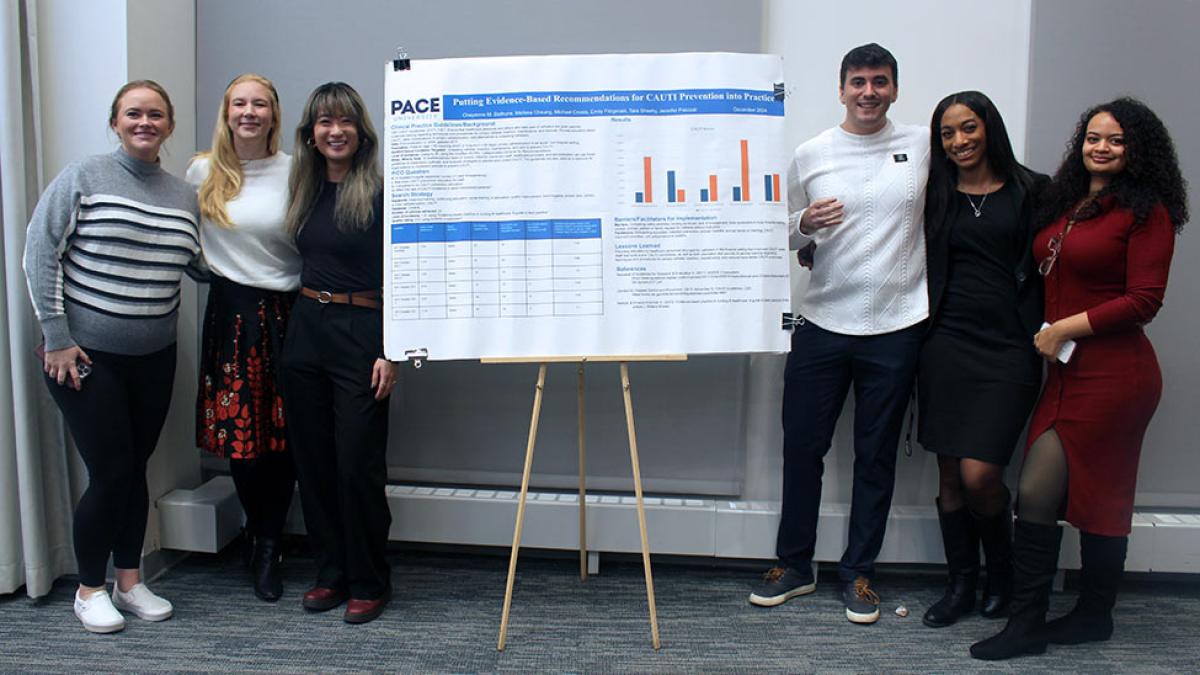
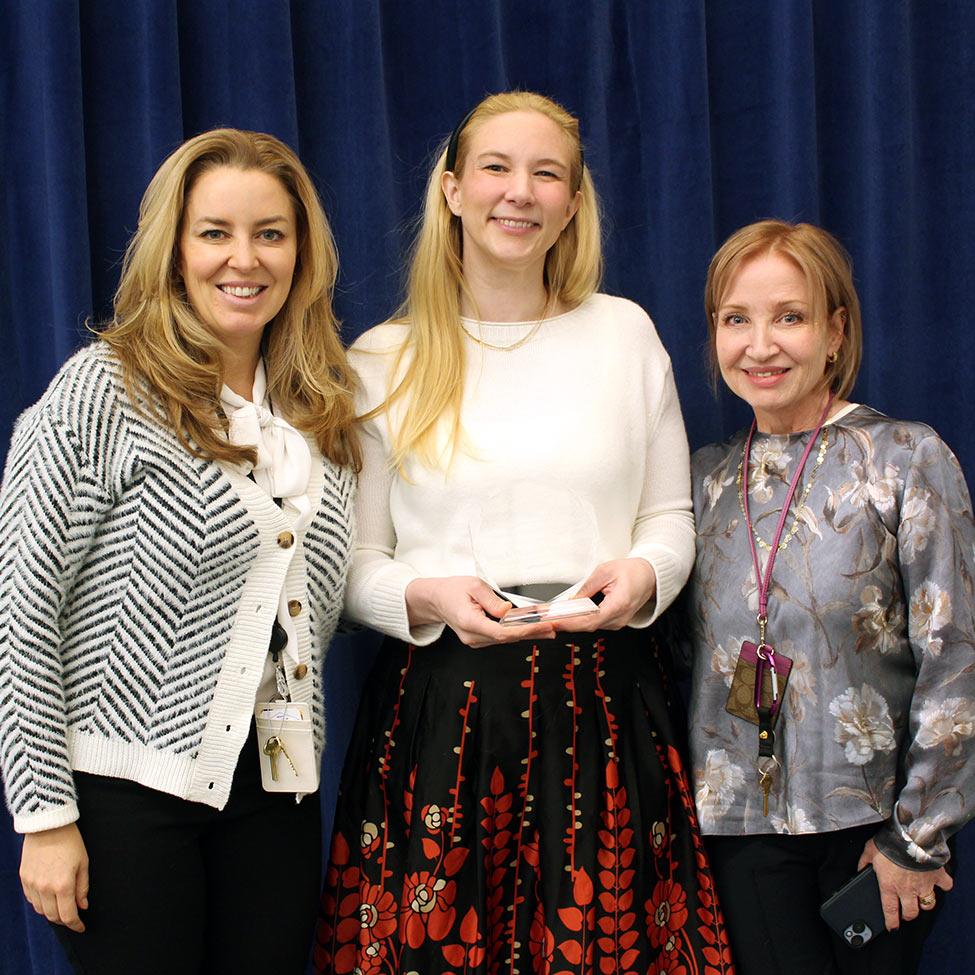
“Why did you become a nurse?” is a question that many of the Pace University’s College of Health Professions (CHP) Lienhard School of Nursing community are asked and each has a different answer.
When we asked Adult-Gerontology Acute Care Nurse Practitioner (AGACNP) class of 2024 graduate and Outstanding Academic Achievement in Nursing awardee, Emily Fitzgerald, she shared that her inspiration came from volunteering. Emily had been working as a victim advocate in the emergency room as part of the Beth Israel Rape Crisis and Domestic Violence Intervention program.
After completing her undergraduate degree, Emily worked as a post-anesthesia care unit (PACU) registered nurse (RN) for Memorial Sloan Kettering Cancer Center. Then COVID-19 hit, and her life changed.
In addition to her full-time job at Memorial Sloan Kettering, Emily took on working at the U.S. Army’s emergency field hospital for Covid positive patients in the Jacob K. Javits center. According to an article published in Military Medicine in 2022, the work done at the Javits center during the pandemic was largest non-wartime pandemic-response field hospital mobilization in the U.S. medical history.
“My experience as a civilian RN collaborating with active-duty navy and military personnel to provide care for COVID-19+ patients in a deployed environment inspired me to pursue higher education,” Emily shared.
After choosing AGACNP as her program concentration because it aligned with her background experience working in the cardiothoracic intensive care unit (ICU) and PACU and wanting to continue her career in a hospital setting, Emily discovered CHP while talking to a friend and colleague, Isabella Henry. Isabella herself had recently graduated from the AGACNP program in 2021, and it was her recommendation that led to Emily attending Pace.
Once the program started, Emily’s favorite part was how hands-on the learning opportunities were. The clinical skills days, organized by professors Kristina Demarco, DNP, and Rhonda D’Agostino, DNP, were stand-out moments in the program.
“We have dedicated lab skills days for our acute care nurse practitioner students to introduce evidence based bedside skills. We expand the students’ didactic knowledge by providing procedural and diagnostic reasoning training ranging from diagnostic test interpretations, performing urgent procedures such as intubation, point of care ultrasound, arterial blood gases, chest tube management, chest x ray readings, and Ventilator management,” explained Professor DeMarco. “As the students advance in the program, we incorporate rapid response training case studies, code stroke, and other acute care scenarios to prepare them for clinical practice as they approach graduation.
In addition to the simulation labs and in-classroom opportunities, Emily had multiple clinical rotations including in the medical intensive care unit (MICU), emergency department, and leukemia inpatient unit.
“Each setting provided unique learning opportunities,” she explained. “While working alongside experienced providers, I was able to gain hands-on experience that reinforced the information we were studying in class.”
The graduate program is not an easy one, which Emily knows firsthand. She worked full time and also welcomed her first child while getting her degree, making it a challenging and exciting time. Emily expressed her gratitude for the support she received from her husband, which allowed her to balance both her academic and personal responsibilities.
In addition to the encouragement she received at home, the faculty were the other large pillar of support.
The faculty mentorship, encouragement, and dedication set me up for success in the program and after graduation.
—Emily Fitzgerald, RN
One professor in particular made the program stand out to Emily; Clinical Professor Elliott Fielding. Professor Fielding leads his groups through case studies and provides additional support during clinical rotations. He enriched students’ clinical experiences by sharing his real-world experience as a nurse practitioner (NP). His insights and teaching style made complex concepts more applicable to practice.
Upon graduating in December 2024, Emily received the Outstanding Academic Achievement in Nursing award for the AGACNP program. This honor is only given to one AGACNP student each year and symbolizes their dedication to their education and to the program.
Post-graduation, Emily plans to continue working for Memorial Sloan Kettering as a nurse practitioner in an inpatient hematology/oncology service. She is currently preparing to take the national boards exam to become certified as an Adult-Gerontology Acute Care Nurse Practitioner.
A Night of Celebration and Innovation: The 2025 Seidenberg Innovation Awards
The Seidenberg School of Computer Science and Information Systems hosted the annual Seidenberg Innovation Awards (SIA) at Pace University’s New York City campus, bringing together leaders in technology, education, and business to recognize innovation, community impact, and the next generation of tech professionals.
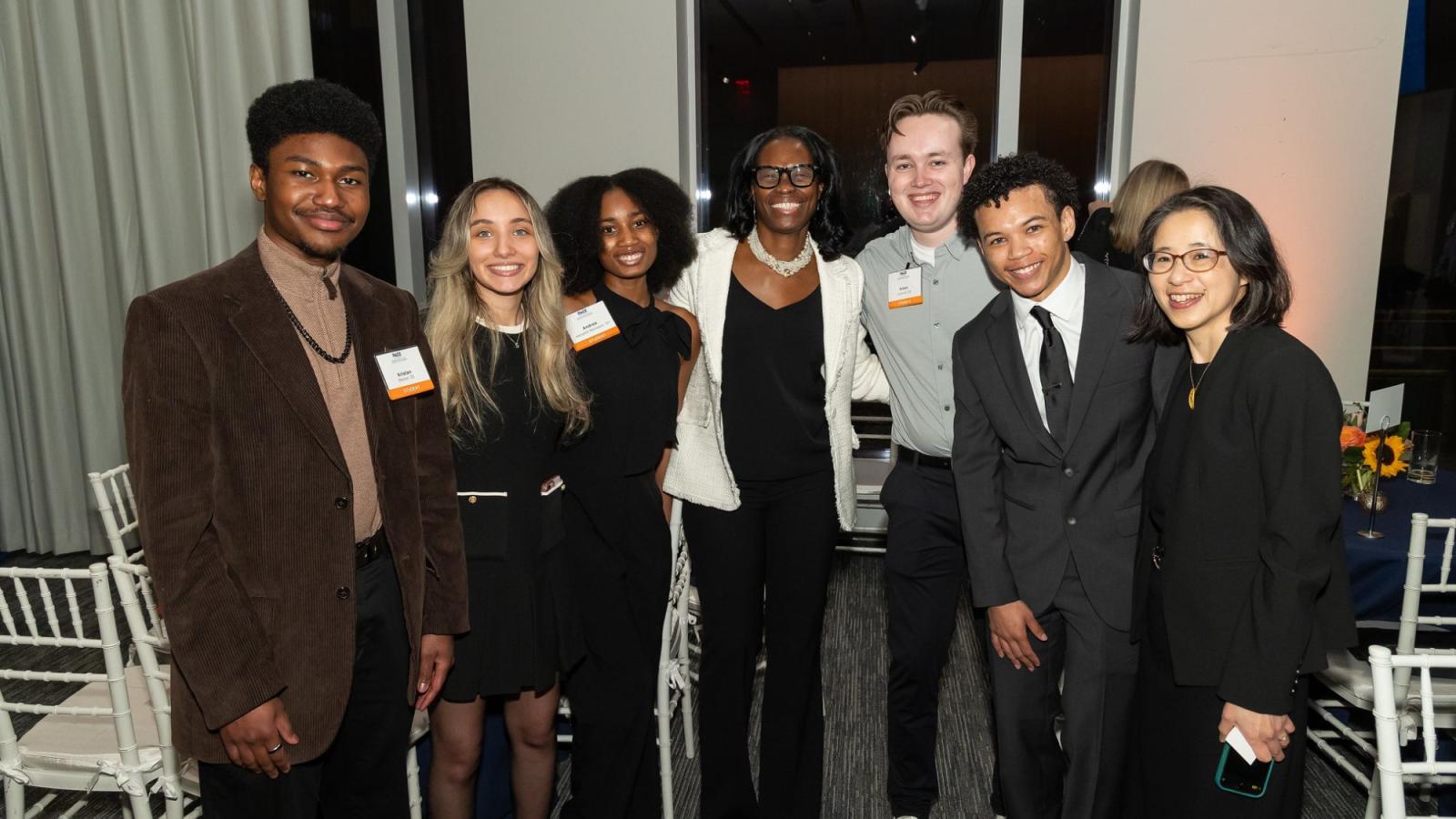
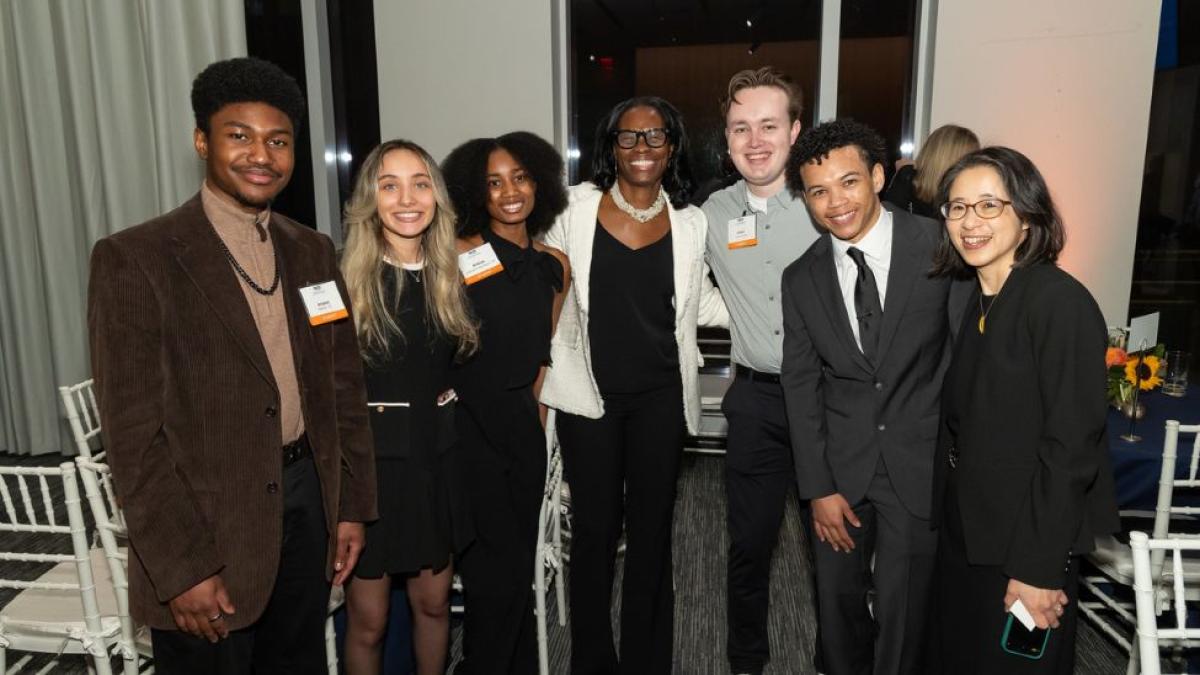
On April 3, 2025, the Seidenberg School of Computer Science and Information Systems hosted the annual Seidenberg Innovation Awards (SIA) at Pace University’s New York City campus, bringing together leaders in technology, education, and business to recognize innovation, community impact, and the next generation of tech professionals. The event celebrated leaders who support the continued advancement of education, raising critical funds to enhance access and elevate students of diverse backgrounds to be appropriately prepared for meaningful careers in tech.
For this year’s edition of SIA, co-chaired by Vipul Nagrath '94, MS '96, Nicholas M. Donofrio, and John Gibbons, MS '14, we honored three exceptional individuals who embody the spirit of the event.
Sridhar Potineni, Chief Information Officer of Newmark, was recognized for his innovative work in driving digital transformation across the commercial real estate industry. With over two decades of experience, Sri has led pioneering efforts in AI, data strategy, and global technology platforms that support real estate investment and automation on a massive scale. His leadership reflects a commitment to pushing industry boundaries through innovation.
Heather M. Schneider ‘99, partner at a leading intellectual property law firm and President of the New York Intellectual Property Association, was celebrated for her influential role in shaping the legal landscape of technology and life sciences. Her litigation and transactional work spans biotech, software, and IP strategy, with involvement in high-profile matters including COVID-19 treatment development and cutting-edge medical technologies. Heather's dedication to intellectual property rights and equitable access to innovation has always stood out as a defining force in her career.
Yolanda Stancil, Senior Vice President of Wireline Network Field Operations at Verizon, was honored for her decades-long leadership in building and maintaining one of the nation's most complex broadband and telecommunications infrastructures. Yoli oversees a team of over 16,000 professionals and has led major operational efforts in the New York Metro region and beyond. A passionate advocate for education and community equity, she was also recognized as a 2023–2024 Fellow for the NYC David Rockefeller Fellows Program, playing an active role in shaping the future for NYC.
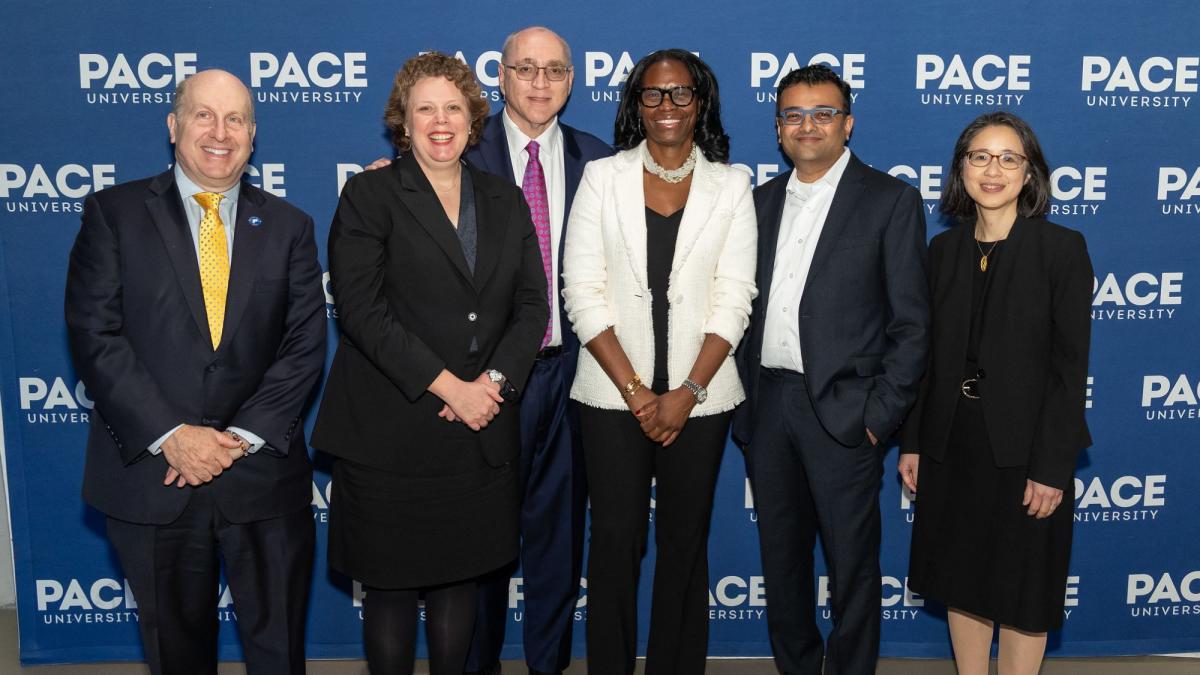
While the evening’s main focus was on celebrating the achievements of Sridhar, Heather, and Yolanda, it was also a powerful reminder of Seidenberg’s mission: to prepare students through experiential learning, applied research, and real-world engagement. The event featured networking opportunities and a formal awards program, while also shining a spotlight on Seidenberg students in attendance. Several students had been personally mentored by the honorees and shared heartfelt introductions that reflected the impact of those relationships.
Proceeds from the event will directly benefit student scholarships and strategic initiatives within the Seidenberg School, supporting hands-on education for students who will shape the future of technology. As we are already beginning to look forward to the 2026 edition of SIA, the Seidenberg team would like to thank all the students, faculty, staff, honorees, and guests who made the celebration such a memorable night.